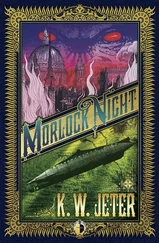K Jeter - Infernal Devices
Здесь есть возможность читать онлайн «K Jeter - Infernal Devices» весь текст электронной книги совершенно бесплатно (целиком полную версию без сокращений). В некоторых случаях можно слушать аудио, скачать через торрент в формате fb2 и присутствует краткое содержание. Жанр: Фантастика и фэнтези, на английском языке. Описание произведения, (предисловие) а так же отзывы посетителей доступны на портале библиотеки ЛибКат.
- Название:Infernal Devices
- Автор:
- Жанр:
- Год:неизвестен
- ISBN:нет данных
- Рейтинг книги:3 / 5. Голосов: 1
-
Избранное:Добавить в избранное
- Отзывы:
-
Ваша оценка:
- 60
- 1
- 2
- 3
- 4
- 5
Infernal Devices: краткое содержание, описание и аннотация
Предлагаем к чтению аннотацию, описание, краткое содержание или предисловие (зависит от того, что написал сам автор книги «Infernal Devices»). Если вы не нашли необходимую информацию о книге — напишите в комментариях, мы постараемся отыскать её.
Infernal Devices — читать онлайн бесплатно полную книгу (весь текст) целиком
Ниже представлен текст книги, разбитый по страницам. Система сохранения места последней прочитанной страницы, позволяет с удобством читать онлайн бесплатно книгу «Infernal Devices», без необходимости каждый раз заново искать на чём Вы остановились. Поставьте закладку, и сможете в любой момент перейти на страницу, на которой закончили чтение.
Интервал:
Закладка:
"Where – where have you been hiding?" I asked when his stifling hand had been drawn away. "You've been aboard all this time?"
He gestured for me to lower my voice further. The moon and stars glinted from his dark face and shoulders, still wet from the sea. "To me listen," he said. "There is little time, and much to tell."
Thereupon followed, as I knelt close to his soft voice, the exposition I herewith summarize. Even if I succeeded in reproducing his exact words (minus my own exclamations of surprise, which rather lengthened the discourse), I would still fail to convey the eerie wonderment evoked by his narration.
He told me his real name, but the human voice lacks the facility to properly pronounce so strange a cognomen; I continued to identify him in my mind as I had done when he had first entered my London shop. He claimed and it was soon enough proven to me, banishing any residual scepticism I might have harboured – to be the last surviving member of an amphibious race, at home in the depths of the seas rather more than upon dry land. His people were the basis for the various tales and legends of "selkies" common to the Scottish islands. In support of this point, he demonstrated to me that what I had taken to be his brownish skin, was in fact a thin, pliable covering – a species of leather indeed, though marine in origin constructed to hold a layer of salt-water, essential to his survival, around his body; the marks that I had taken to be scars in the manner of African tribesmen were the finely worked stitches holding this garment together.
The Brown Leather Man continued from the singular to the general, his discourse forming a natural history of his race. Never very numerous and always secretive, the selkies – to use the most convenient term – maintained through the long years a few friendly contacts with human beings; the various sailors' yarns of miraculous rescues from ships lost at sea had this basis in reality. As befit their piscine physiology, the selkies' reproductive processes were external, fertilization and growth of the resultant embryos taking place in large beds of seaweed; these sites, the only ones suitable, were located in the waters off the island of Groughay. Unfortunately, the activities of mankind had a disastrous effect upon the situation. Readers of sufficient age may recall that, towards the end of the previous century, a lucrative boom in the trade of seaweed occurred. It was gathered in large quantities from the shores of the distant Scottish islands, charred into a soft black substance, and distributed throughout Britain for use as a fertilizer. (Readers familiar with contemporary agricultural practices will be aware that other, more productive substances have supplanted the seaweed for this purpose; there is virtually no trade in it at the present time.) One of those who had profited from the market for seaweed had been the young head of the clan based upon Groughay, Lord Bendray. He had sought to accelerate the process of turning seaweed into money by commissioning a device from a clever London inventor – my own father. The device that resulted from this commission was a set of wooden booms that, once installed under my father's personal supervision on Groughay, extended into the ocean, and were kept submerged by heavy chains. When directed underneath the offshore seaweed beds, the booms would be released from the chains, thus rising to the surface and tangling into the marine vegetation. The seaweed could then be drawn towards the shore by winches, at a rate many times greater than the tides previously had brought it, and thus harvested. My father's device worked well, securely establishing the Bendray family fortune before the collapse in the seaweed market came.
(This history related by the Brown Leather Man brought back to mind Lord Bendray's rambling words in his cellar laboratory beneath Bendray Hall. I had then dismissed his talks of seaweed as nothing more than the wild ravings of a disordered mind; but I did recall that he had made passing reference to his first commission to my father having something to do with the substance.)
It was while on Groughay (so the Brown Leather Man's exposition continued), while my father was installing this seaweed gathering device, that he came into contact with the aquatic race of selkies. Perhaps there was some attraction between minds of similar brilliance: the selkies, being of a philosophical and inquiring breed, possessed much advanced theoretical knowledge pertaining to matters little investigated by human scientists. It was from them that my father learned those arcane principles of sympathetic vibrations in rarefied media, that he subsequently employed in his later inventions such as the Paganinicon. The Brown Leather Man related that my father made several journeys to the island of Groughay, long after the price of seaweed fertilizer had plummeted in 1811, the gathering device been abandoned, and the island depopulated, for the express purpose of consulting with the learned selkie elders on scientific issues.
Or, at least, my father had done so while the selkies still survived as a race. He had, all unwittingly, unleashed the machinery of their doom upon them. The seaweed gathering device so disrupted the cycles of their lives and breeding, that the race began to die out. This fatal process accelerated at a geometric progression, the lifespan of those already born being shortened as well, perhaps through a collective grief. No rancour had ever entered into the relationship with my father; even now, only forgiveness existed in the heart of the Brown Leather Man, the last of his people. Their gentle wisdom had seen that such an outcome had never been intended.
The Brown Leather Man, however, had determined that there was yet some hope. The seaweed beds of the coast of Groughay, unmolested for so long a time, had re-established themselves to their original extent. Even more heartening was his discovery that a number of selkie embryos, in a spore-like state, had survived the process of converting the seaweed to fertilizer. In one spot where the fertilizer had been used, the fens around the village of Dampford, the embryos had matured, come of age, and even managed to mate with the inbred and somewhat devolved natives of that sorry region. The Brown Leather Man was not the first to discover this: Lord Bendray himself had made his decision to buy up the district and establish his residence there, prompted by his recognition of the Dampford villagers for what they were – a cross between humans and the selkies he had been aware of from his youth on the island of Groughay. Being remarkably dull-witted, the cross-bred Dampford villagers were easily victimised by another of Lord Bendray's moneymaking schemes, in which the village girls – their unlovely visages matched by corresponding alterations to their anatomies (I did not press him for elaboration on the subject) were lured into Mollie Maud's service in London to satisfy the jaded passions of her wealthy and bored clientele. So successful had this trade been – as trades dealing in the seemingly endless lusts of men usually are – that eventually a whole subculture of Dampford villagers, male and female, had been established in London, forming the amorphous borough of Wetwick that I had stumbled upon. To increase these innocents' isolation and thus reduce the chance of their escaping from Lord Bendray's and Mollie Maud's domination, Lord Bendray had created a mock religion for them, centred upon the fictional Saint Monkfish. To avoid detection, the Church of Saint Monkfish has no set place of worship, but rather floats from place to place in the city. The denizens of Wetwick – for so their supposed benefactors Lord Bendray, had named them – are summoned to services by a bell that Lord Bendray had especially cast for the purpose, with a note pitched too high for ordinary humans to hear; the selkie crossbreeds, with their seaborne origins, have a range of hearing different from that of ordinary human beings. The elderly of the tribe (as with humans long in tooth), having lost the highest-pitched portion of their hearing, have dogs trained to listen for the striking of their church bell and to guide them to the location of the services. Just such a "bell-dog" was the eponymous Abel, sleeping below-deck in my cabin. The dogs served another, even more sinister purpose: they were useful for various cabbies catering to depraved tastes, in order to deliver their passengers to the district where their pleasures could be catered to by the wretched employees of Mollie Maud. The coiner Fexton, as a convert to the worship of Saint Monkfish, had need of such an animal as well. Lord Bendray, with his thorough scientific mind, had even created an alternative economy for the Wetwick residents; its coinage, with the portrait of the mythical Saint Monkfish upon it, also served as an identifying emblem for those humans who had been initiated into the secrets of the borough's clandestine existence.
Читать дальшеИнтервал:
Закладка:
Похожие книги на «Infernal Devices»
Представляем Вашему вниманию похожие книги на «Infernal Devices» списком для выбора. Мы отобрали схожую по названию и смыслу литературу в надежде предоставить читателям больше вариантов отыскать новые, интересные, ещё непрочитанные произведения.
Обсуждение, отзывы о книге «Infernal Devices» и просто собственные мнения читателей. Оставьте ваши комментарии, напишите, что Вы думаете о произведении, его смысле или главных героях. Укажите что конкретно понравилось, а что нет, и почему Вы так считаете.












